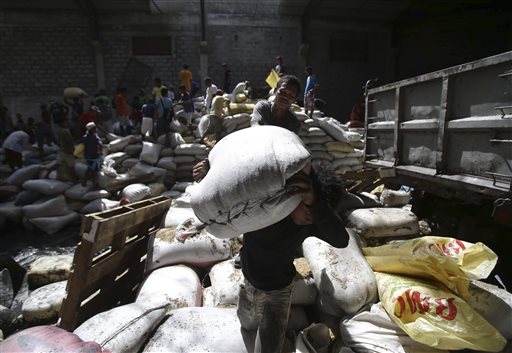
In this Monday, Nov. 11, 2013 file photo, survivors carry bags of rice from a warehouse which they stormed due to shortage of food at typhoon-ravaged Tacloban city, Leyte province central Philippines. Haiyan slammed the island nation with a storm surge two stories high and some of the highest winds ever measured in a tropical cyclone. An untold number of homes were blown away, and thousands of people are feared dead. AP
TACLOBAN CITY, Philippines — Thousands of people stormed a rice warehouse on an island devastated by Typhoon Haiyan, authorities said Wednesday, highlighting the urgent need to get water, food and medical supplies into an increasingly desperate region.
Five days after one of the strongest tropical storms on record leveled tens of thousands of houses in the central Philippines, relief operations were only starting to pick up pace, with two more airports in the region reopening, allowing for more aid flights.
But minimal food and water was reaching people in the devastated city of Tacloban, on Leyte island, which bore the brunt of the storm, and outlying regions due to a lack of trucks and blocked roads.
“There’s a bit of a logjam to be absolutely honest getting stuff in here,” said Sebastian Rhodes Stampa, from the United Nations Office for the Coordination of Humanitarian Affairs.
“You’ve had quite a lot of security coming in over the last couple of days, less so other things. So then it gets here and then we’re going to have a real challenge with logistics in terms of getting things out of here, into town, out of town, into the other areas,” he said from the airport in Tacloban.
“The reason for that essentially is that there are no trucks, the roads are all closed.”
In the first reported deaths as a result of looting, eight people were crushed to death Tuesday when a wall collapsed as they and thousands of others stormed a rice warehouse on Leyte Island, said National Food Authority spokesman Rex Estoperez.
The looters in Alangalang municipality carted away up to 100,000 sacks of rice, he said.
Since the storm, people have broken into homes, malls and garages, where they have stripped the shelves of food, water and other goods. Authorities have struggled to stop the looting. There have been unconfirmed reports of armed gangs involved in some instances.
Police were working to keep order across the ravaged wasteland. An 8 p.m. to 5 a.m. curfew was in place.
“We have restored order,” said Carmelo Espina Valmoria, director of the Philippine National Police special action force. “There has been looting for the last three days, (but) the situation has stabilized.”
U.S. Brig Gen. Paul Kennedy said that later Wednesday his troops would install equipment at Tacloban airport to allow planes to land at night. Tacloban, a city of 220,000, was almost completely destroyed in Friday’s typhoon and has become the main relief hub.
“You are not just going to see Marines and a few planes and some helicopters,” Kennedy said. “You will see the entire Pacific Command respond to this crisis.”
A Norwegian ship carrying supplies left from Manila, while an Australian air force transport plane took off from Canberra carrying a medical team. British and American navy vessels are also en route to the region.
At the damaged airport in Tacloban, makeshift clinics have been set up and thousands of people were looking for a flight out. A doctor here said supplies of antibiotics and anesthetics arrived Tuesday for the first time.
“Until then, patients had to endure the pain,” said Dr. Victoriano Sambale.
At least 580,000 people have been displaced by the disaster. In some places, tsunami-like storm surges swept up to one-kilometer (mile) inland, causing more destruction and loss of life. Most of the death and destruction appears concentrated on the islands of Samar and Leyte.
The damaged infrastructure and bad communications links made a conclusive death toll difficult to estimate.
The official toll from a national disaster agency rose to 2,275 on Wednesday. President Benigno Aquino III told CNN in a televised interview that the toll could be closer to 2,000 or 2,500, lower than an earlier estimate from two officials on the ground who said they feared as many as 10,000 might be dead.
“There is a huge amount that we need to do. We have not been able to get into the remote communities,” U.N. humanitarian chief Valerie Amos said in Manila, launching an appeal for $301 million to help the more than 11 million people estimated to be affected by the storm.
“Even in Tacloban, because of the debris and the difficulties with logistics and so on, we have not been able to get in the level of supply that we would want to. We are going to do as much as we can to bring in more,” she said. Her office said she planned to visit the city.
Relief officials said comparing the pace of this operation to those in past disasters was difficult.
In Indonesia’s Aceh, the worst-hit region by the 2004 tsunami, relief hubs were easier to set up than in Tacloban. The main airport there was functioning 24 hours a day within a couple of days of the disaster. While devastation in much of the city of Banda Aceh was total, large inland parts of the city were undamaged, providing a base for aid operations and temporary accommodation for the homeless.
RELATED STORIES:
‘Yolanda’ death toll jumps to 2,275
Leyte NFA warehouse being stormed by hungry villagers collapses; 8 die